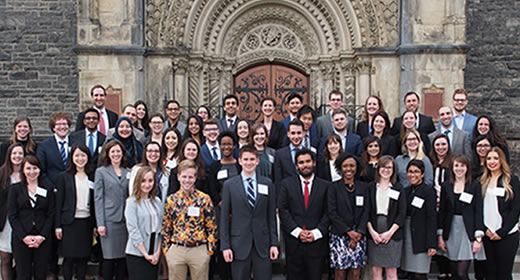
On Friday March 11, 23 Ford School master’s students traveled to the University of Toronto’s School of Public Policy and Governance for "Ford + SPPG," our annual student-led policy conference and case competition. Each year, the event brings together students from both schools in a collaborative learning environment to analyze, evaluate, and present key findings related to a current policy issue.
This year’s conference, “Closing the Gap,” tackled inequality in the U.S. and Canada. On Friday, students heard comparative perspectives on income inequality from the following panelists: Dalton McGuinty, former premier of Ontario; Trish Hennessy, director of the Canadian Centre for Policy Alternatives (Ontario); Dr. Carolyn Tuohy, professor emeritus and senior fellow at SPPG; and Dr. Daniyal Zuberi, associate professor of social policy at SPPG.
On Saturday, students broke into teams to tackle the case, which called for a holistic, evidence-based proposal to diminish economic inequality in the province of Ontario. The case asked students to choose between an affordable housing strategy, income-based redistribution, and a labor-market based approach, keeping in mind the political benefits to an approach that could yield measureable outcomes in 3-5 years.
Students presented their analyses to a distinguished panel of judges, including John Ciorciari, assistant professor of public policy at the Ford School.
Ford School students Seiya Ninomiya (MPP ‘16), Melanie Pitkin (MPP ’17), and Josh Rivera (MPP ’17) teamed up with SPPG students Taylor Davis and Alyssa Wali and won the competition with an innovative four-part proposal on affordable housing.
The students called on the government of Ontario to reform land-use zoning and promote transportation-centered development; implement a housing voucher system for low-income families; work with the private sector to expand asset-building services; and expand Ontario’s rental income assistance program.
Special thanks to the School of Public Policy and Governance for hosting this year's competition - we'll see you next year in Ann Arbor!
--Story by Afton Branche (MPP '17)
